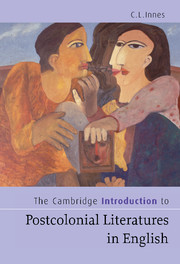Book contents
- Frontmatter
- Contents
- Preface
- Chapter 1 Introduction: situating the postcolonial
- Chapter 2 Postcolonial issues in performance
- Chapter 3 Alternative histories and writing back
- Chapter 4 Authorizing the self: postcolonial autobiographical writing
- Chapter 5 Situating the self: landscape and place
- Chapter 6 Appropriating the word: language and voice
- Chapter 7 Narrating the nation: form and genre
- Chapter 8 Rewriting her story: nation and gender
- Chapter 9 Rewriting the nation: acknowledging economic and cultural diversity
- Chapter 10 Transnational and black British writing: colonizing in reverse
- Chapter 11 Citizens of the world: reading postcolonial literature
- Notes
- Glossary of terms used (compiled by Kaori Nagai)
- Biographies of selected postcolonial writers (compiled by Kaori Nagai)
- Brief colonial histories: Australia, the Caribbean, East Africa, India and Pakistan, Ireland, West Africa (compiled by Kaori Nagai)
- Select bibliography
- Index
Chapter 1 - Introduction: situating the postcolonial
Published online by Cambridge University Press: 05 June 2012
- Frontmatter
- Contents
- Preface
- Chapter 1 Introduction: situating the postcolonial
- Chapter 2 Postcolonial issues in performance
- Chapter 3 Alternative histories and writing back
- Chapter 4 Authorizing the self: postcolonial autobiographical writing
- Chapter 5 Situating the self: landscape and place
- Chapter 6 Appropriating the word: language and voice
- Chapter 7 Narrating the nation: form and genre
- Chapter 8 Rewriting her story: nation and gender
- Chapter 9 Rewriting the nation: acknowledging economic and cultural diversity
- Chapter 10 Transnational and black British writing: colonizing in reverse
- Chapter 11 Citizens of the world: reading postcolonial literature
- Notes
- Glossary of terms used (compiled by Kaori Nagai)
- Biographies of selected postcolonial writers (compiled by Kaori Nagai)
- Brief colonial histories: Australia, the Caribbean, East Africa, India and Pakistan, Ireland, West Africa (compiled by Kaori Nagai)
- Select bibliography
- Index
Summary
Over the past half-century, postcolonial literatures and postcolonial studies have gained the attention of more and more readers and scholars throughout the world. Writers as diverse as Chinua Achebe and Wole Soyinka from Nigeria, Salman Rushdie and Arundhati Roy from India, Derek Walcott from the Caribbean, Seamus Heaney from Ireland, Margaret Atwood and Michael Ondaatje from Canada, Peter Carey and Patrick White from Australia, and J. M. Coetzee and Nadine Gordimer from South Africa have been prominent when major literary awards such as the Booker Prize or the Nobel Prize have been announced, and their works now appear on numerous school and university syllabuses. Concurrently, their writing has provided the nourishment for a variety of postcolonial theories concerning the nature of such works, approaches to reading them, and their significance for reading and understanding other literary, philosophical and historical works. Indeed, the production of introductions to postcolonial theory has become a major industry. However, this book seeks to focus on the literary texts rather than the theories, and to give a general sense of the issues and choices which inform the writing and reading of those texts. It will discuss the ways in which these issues have changed over the decades, involving questions of genre, form and language, as well as social and political concerns; it will also discuss how these texts may be read and responded to in different contexts.
- Type
- Chapter
- Information
- Publisher: Cambridge University PressPrint publication year: 2007

